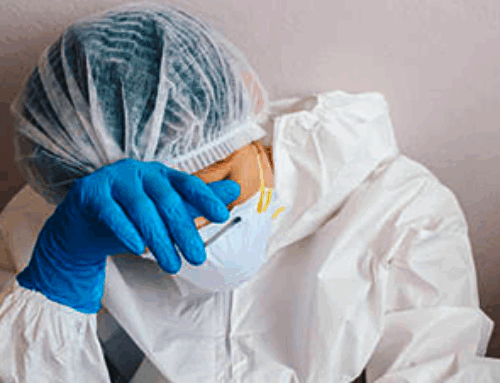A study from Cedars-Sinai’s Smidt Heart Institute suggests that immune system dysfunction could be causing long COVID-19. The study found that patients with long COVID-19 produced antibodies against the virus for an extended period after vaccination, with especially high levels of nucleocapsid antibodies. The implications of this sustained immune response are still unclear, and researchers are now seeking a definitive biomarker for diagnosing and understanding long COVID-19.
Findings show people with long COVID-19 respond differently to COVID-19 vaccines.
A new study by investigators from the Smidt Heart Institute at Cedars-Sinai suggests long COVID-19 might be caused by a dysfunction of the immune system.
The study, published in the journal BMC Infectious Diseases, found that after people with long COVID-19 received the COVID-19 vaccine, they produced antibodies against the virus that causes COVID-19 for months longer than expected.
“There’s general consensus that some level of aberrant immune response happens in long COVID-19, and this study adds to the evidence to suggest this is true,” said Catherine Le, MD, co-director of the Cedars-Sinai COVID-19 Recovery Program and a senior author of the study.
Long COVID-19, a condition in which people experience COVID-19-related symptoms three months or more after initial infection with the virus that causes COVID-19, is estimated to affect 65 million people worldwide. Common symptoms include fatigue, shortness of breath, and cognitive dysfunction such as confusion and forgetfulness. Some symptoms can have debilitating effects.
To study the immune response of people with long COVID-19, investigators analyzed blood samples from 245 people diagnosed with long COVID-19 and 86 people who had COVID-19 and fully recovered. All the study participants had received either one or two doses of a COVID-19 vaccine regimen.
“We examined one part of the immune system response, the production of antibodies, which is mediated by immune cells called B-cells,” Le explained.
Specifically, the investigators looked at two types of antibodies that attack the virus that causes COVID-19. One of these is called the spike protein antibody, which attacks a protein on the exterior of the virus. The other is the nucleocapsid antibody, which attacks the part of the virus that allows it to replicate.
The investigators found that people who were diagnosed with long COVID-19 produced higher levels of spike protein and nucleocapsid antibodies than people without long COVID-19. Eight weeks after receiving a dose of the COVID-19 vaccine, antibody levels in people without long COVID-19 began to decrease, as was expected. People with long COVID-19, however, continued to have elevated antibody levels, especially of nucleocapsid antibodies.
“What you would expect after getting a COVID-19 vaccination is a jump in your spike protein antibody levels, but you wouldn’t expect a significant increase in nucleocapsid antibody levels,” said Susan Cheng, MD, MPH, the Erika J. Glazer Chair in Women’s Cardiovascular Health and Population Science, director of the Institute for Research on Healthy Aging in the Department of Cardiology at the Smidt Heart Institute, and a senior author of the study. “You would also expect these levels to eventually decrease and not persist for so long after vaccination.”
Although this study shows that long COVID-19 affects the immune system, it’s too soon to draw firm conclusions from these findings, according to the study’s authors.
“Theoretically, the production of these antibodies could mean that people are more protected from infection,” Le said. “We also need to investigate if the elevated immune response corresponds with severity or number of long COVID-19 symptoms.”
Investigators are continuing to study blood samples from people with long COVID-19. They are hoping to identify a measurable molecule that could be used to diagnose long COVID-19 and better understand the biological processes that cause it.
News
Studies detail high rates of long COVID among healthcare, dental workers
Researchers have estimated approximately 8% of Americas have ever experienced long COVID, or lasting symptoms, following an acute COVID-19 infection. Now two recent international studies suggest that the percentage is much higher among healthcare workers [...]
Melting Arctic Ice May Unleash Ancient Deadly Diseases, Scientists Warn
Melting Arctic ice increases human and animal interactions, raising the risk of infectious disease spread. Researchers urge early intervention and surveillance. Climate change is opening new pathways for the spread of infectious diseases such [...]
Scientists May Have Found a Secret Weapon To Stop Pancreatic Cancer Before It Starts
Researchers at Cold Spring Harbor Laboratory have found that blocking the FGFR2 and EGFR genes can stop early-stage pancreatic cancer from progressing, offering a promising path toward prevention. Pancreatic cancer is expected to become [...]
Breakthrough Drug Restores Vision: Researchers Successfully Reverse Retinal Damage
Blocking the PROX1 protein allowed KAIST researchers to regenerate damaged retinas and restore vision in mice. Vision is one of the most important human senses, yet more than 300 million people around the world are at [...]
Differentiating cancerous and healthy cells through motion analysis
Researchers from Tokyo Metropolitan University have found that the motion of unlabeled cells can be used to tell whether they are cancerous or healthy. They observed malignant fibrosarcoma cells and [...]
This Tiny Cellular Gate Could Be the Key to Curing Cancer – And Regrowing Hair
After more than five decades of mystery, scientists have finally unveiled the detailed structure and function of a long-theorized molecular machine in our mitochondria — the mitochondrial pyruvate carrier. This microscopic gatekeeper controls how [...]
Unlocking Vision’s Secrets: Researchers Reveal 3D Structure of Key Eye Protein
Researchers have uncovered the 3D structure of RBP3, a key protein in vision, revealing how it transports retinoids and fatty acids and how its dysfunction may lead to retinal diseases. Proteins play a critical [...]
5 Key Facts About Nanoplastics and How They Affect the Human Body
Nanoplastics are typically defined as plastic particles smaller than 1000 nanometers. These particles are increasingly being detected in human tissues: they can bypass biological barriers, accumulate in organs, and may influence health in ways [...]
Measles Is Back: Doctors Warn of Dangerous Surge Across the U.S.
Parents are encouraged to contact their pediatrician if their child has been exposed to measles or is showing symptoms. Pediatric infectious disease experts are emphasizing the critical importance of measles vaccination, as the highly [...]
AI at the Speed of Light: How Silicon Photonics Are Reinventing Hardware
A cutting-edge AI acceleration platform powered by light rather than electricity could revolutionize how AI is trained and deployed. Using photonic integrated circuits made from advanced III-V semiconductors, researchers have developed a system that vastly [...]
A Grain of Brain, 523 Million Synapses, Most Complicated Neuroscience Experiment Ever Attempted
A team of over 150 scientists has achieved what once seemed impossible: a complete wiring and activity map of a tiny section of a mammalian brain. This feat, part of the MICrONS Project, rivals [...]
The Secret “Radar” Bacteria Use To Outsmart Their Enemies
A chemical radar allows bacteria to sense and eliminate predators. Investigating how microorganisms communicate deepens our understanding of the complex ecological interactions that shape our environment is an area of key focus for the [...]
Psychologists explore ethical issues associated with human-AI relationships
It's becoming increasingly commonplace for people to develop intimate, long-term relationships with artificial intelligence (AI) technologies. At their extreme, people have "married" their AI companions in non-legally binding ceremonies, and at least two people [...]
When You Lose Weight, Where Does It Actually Go?
Most health professionals lack a clear understanding of how body fat is lost, often subscribing to misconceptions like fat converting to energy or muscle. The truth is, fat is actually broken down into carbon [...]
How Everyday Plastics Quietly Turn Into DNA-Damaging Nanoparticles
The same unique structure that makes plastic so versatile also makes it susceptible to breaking down into harmful micro- and nanoscale particles. The world is saturated with trillions of microscopic and nanoscopic plastic particles, some smaller [...]
AI Outperforms Physicians in Real-World Urgent Care Decisions, Study Finds
The study, conducted at the virtual urgent care clinic Cedars-Sinai Connect in LA, compared recommendations given in about 500 visits of adult patients with relatively common symptoms – respiratory, urinary, eye, vaginal and dental. [...]





















